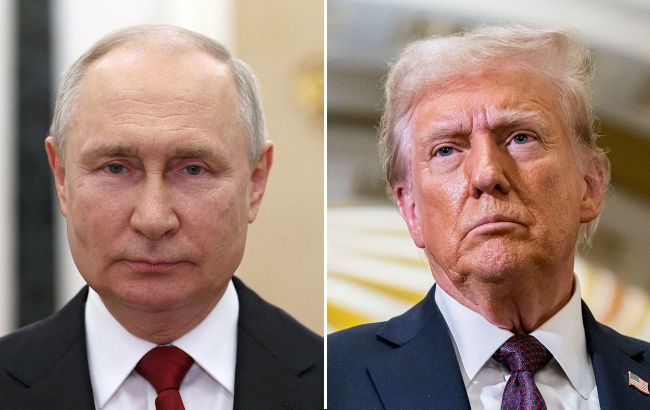Ultimatum for Putin – discount for China: How Trump’s tariffs will hit Russia
 Photo: Russian President Vladimir Putin and US President Donald Trump (collage by RBC-Ukraine)
Photo: Russian President Vladimir Putin and US President Donald Trump (collage by RBC-Ukraine)
Despite the fact that some experts expected to hear more concrete actions from Washington toward Moscow in Donald Trump’s recent address, what the US President announced could still have serious consequences for the Russian economy.
Economic experts Oleksii Plotnikov and Oleh Ustenko stated this in a comment to RBC-Ukraine.
Trump decides to reduce secondary tariffs fivefold
On July 14, Donald Trump announced his intention to impose secondary tariffs of 100% on countries that trade with Russia. However, he gave Moscow 50 days to reach an agreement to end the war, while noting that four previous attempts to prepare such a deal had already failed.
"We’re going to be doing very severe tariffs if we don’t have a deal in 50 days, tariffs at about 100 per cent, you’d call them secondary tariffs," the president stated.
Previously, the US had already drafted a bill proposing 500% secondary tariffs, which Congress was expected to pass following Trump’s approval. But now the president has decided to reduce the tariffs fivefold.
If imposed, the tariffs would effectively double the price of goods from countries trading with Russia when imported into the US. Trump emphasized that whether the tariffs are 100% or 500%, "they will still have an effect."
Still, Trump granted Russia a 50-day delay on these sanctions, hoping an agreement could still be finalized, even though four attempts to negotiate with Moscow have already failed.
"A 50-day delay in introducing secondary tariffs is a pragmatic move by Trump to give Putin another chance to make a deal," Doctor of Economics Oleksii Plotnikov told RBC-Ukraine.
He noted that this was the first time such a clear statement on secondary tariffs had come directly from the US president. Even with the fivefold reduction, the impact would still be significant if implemented.
"At this scale, whether it’s 100% or 500% doesn’t really matter — the practical impact will be quite strong. And although expectations for the announcement were somewhat higher, I still view it positively. The main thing is that Trump isn’t taking a ‘you go fight, I’ll just watch’ position, but is showing that he stands with Ukraine," Plotnikov said.
Statement on sanctions can already be considered sanctions
Former advisor to the President of Ukraine, Oleh Ustenko, also believes that — even though expectations from the announcement were not fully met — the steps announced by the US could deal a serious blow to Russia.
"Even this statement about plans to impose sanctions can be regarded as a kind of sanction, since it will have a significant effect. I’d highlight two positive aspects. First — the recognition that pressure must be applied; second — the 50-day window given to the Russians to push them toward a peace agreement," he said in a comment to RBC-Ukraine.
According to Ustenko, Trump’s approach is essentially one of waiting. But even this waiting — "when you don’t cut off decisively but delay the decision" — can play a positive role.
In his view, Russia remains in a "suspended state," unsure how severe the US decision might be and how the US president will act next. This uncertainty, Ustenko suggests, could motivate Moscow to reach an agreement, as Trump has indicated.
Ustenko agrees that lowering the tariff rate from 500% to 100% doesn’t make much difference, since the practical effect of a 100% tariff will be so strong that increasing it further would hardly amplify the impact.
"If the tariff is at 100%, then raising it further simply wouldn’t make sense," he noted.
Currently, following Trump’s announcement on tariffs, panic is likely to break out within the Russian leadership. So far, they do not intend to come to negotiations in Moscow, but they will still have to find some way to explain the economic difficulties that are sure to arise.
"I expect the Russian authorities will make boastful statements claiming the situation is under control, that these sanctions aren’t scary, and that they have friends (trade partners - ed.)," the former presidential advisor said confidently.
What could happen to Russia’s economy after Trump’s statement
Oleh Ustenko predicts that Trump’s announcement about the possible introduction of secondary tariffs will trigger a sharp negative reaction in Russia’s stock and financial markets.
"Everything will go down. The initial reaction will be on the stock market, followed by a drop in the share prices of publicly traded companies. Economic prospects will worsen, and the Central Bank of Russia will clearly be aware of this. But how much they will be allowed to intervene to try to save the situation is still unknown. Overall, it’s certain that Russia’s economy will cool down amid quite high inflation of 10%," Ustenko noted.
He believes the Central Bank of Russia will have to raise interest rates. However, in any case, economic growth prospects will shrink, and budget problems will arise.
"How will they solve the budget issues? I think we will see expropriations and redistribution of property in Russia. They will use property as leverage to pressure financial-industrial groups to find money for the budget. Those who agree to share funds will survive. Those who don’t agree will lose their property. Because of this, we can expect dissatisfaction among entrepreneurs and industrialists," Ustenko said.
Reaction of Russia’s friends
Trump’s announcement about imposing secondary tariffs in 50 days will primarily trigger responses from Russia’s allies and biggest trading partners, notably China, India, and Brazil. According to Oleh Ustenko, these countries will try to finalize as many contracts as possible by September to reduce their trade dependence on Russia afterward. China, in particular, will be most interested in such purchases.
"China will try to buy up everything it can from Russia at a massive additional discount, cynically pursuing its purely economic interests — oil, gas, and everything else it needs. So I’m confident we will see an increase in goods flow from Russia to China. There will also be increased shipments from Russia to India and Brazil. These countries will try to replicate China’s strategy and buy up everything they can. During these 50 days, Russia will have to sell all its goods at maximum discounts, like a store before closing," Ustenko said.
On the other hand, Russia will also have to stock up on necessary goods, primarily for the military-industrial complex.
"They will increase purchases of everything they need, including through parallel imports," Ustenko added.

